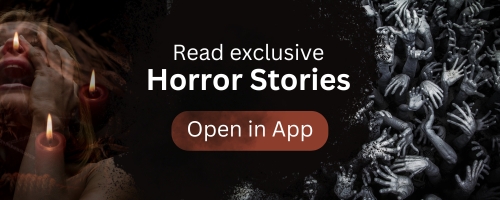Thirst
Thirst


There! It was done. Finally. Over and done with. No use crying over it.
Not that Anuj had any regrets at all. Not in the slightest. This was something he’d been dying - pardon the pun - to do, ever since she’d been born four years ago. A whiny, sniveling baby, come to disrupt the blissfulness of his life that cold, wet August morning. He remembered the rain coming down in torrents that day, blanketing the earth and sky, falling in thick, grey sheets as though it would never stop. And it never did – not for the next seven days. The wettest week Goa had had in the last fifty years, the weather report said. He was six years old then.
He’d hated Nandini almost from the beginning. After all, he’d gone from being ‘star of the show’ to ‘guest appearance’ in a jiffy. Stupid, whiny, sniveling child. And sickly in the bargain. A real horror of a baby. That’s why mum had to spend so much time in the hospital with her. It was almost as if he’d ceased to exist from that day onwards and had become a ghost. That was the beginning of his horror story.
The shock was like a sudden, hard slap on the face; the effects, painful and haunting. And she didn’t make it any easier for him, oh no! “Poor Anuj,” she’d taunt, “The boy with the scary face. Nobody loves him!” Over and over and over again, almost from the time, she could talk. And she was right. Nobody did. At least, not Mama and Dada. “We always wanted a baby girl,” they would tell anyone who would listen. “And now, finally, we got one!”
Yes, they’d got one. And from that time onward, it was, “Anuj, hurry up! You’ll have to get ready by yourself, Mama’s busy with Baby.” Or “Anuj, leave that last piece for Baby. She’s small, you know.” Or “Anuj, don’t hit your little sister. So what if she scratched you? She’s only a little thing.” And so on and so forth. Until he almost burst with rage.
He remembered the turquoise dress she’d worn on her fourth birthday. A frilly, blue-green, gossamer-like, almost translucent piece of fabric, swirling around her in the breeze, making her look rather like a fairy. The whiny, sniveling child had grown into a pretty, sweet-faced little thing, fair and wide-eyed and innocent-looking, who pinched Anuj hard when no-one was looking, and kicked his ankle under the table and stuck out her tongue at him, going on and on like a stuck record, “Poor Anuj, nobody loves him!” over and over and over again. Who always took the last piece of chocolate, or a slice of chocolate cake, or gulab jamun, or whatever. And the one before that. Who grabbed whatever toy or gift he was given, and broke it in no time at all. And then whispered in synthetic, wide-eyed remorse – “It was an accident, Mama. Sho-o-o clumsy of me. Sho-o-rry, Anuj.”
So he’d waited. Biding his time. And finally, on her fourth birthday, he saw his chance.
He waited till the party was over, and the guests had gone home. Dusk had fallen. His mum was in the kitchen, helping Sunita, the maid, to stock the remaining goodies in the fridge. Dad had gone upstairs to change. And Nandini was dancing on the porch of their smart little cottage, her frilly, blue-green party dress swirling around her, looking for all the world like one of Enid Blyton’s fairies come to life.
“Pssst! Hey, Nandini, come here! I want to show you something,” he whispered and beckoned to her urgently.
Her curiosity piqued, she bounced down the steps.
“What is it, Anuj?” she asked eagerly. He put his finger to his lips. “Follow me.”
No-one was looking. His dad’s bedroom was upstairs, on the other side of the house. As was the kitchen on the ground floor.
They made their way stealthily to the pond, fifty meters from the house, now swollen with the rains.
“I saw something in the water,” he whispered, “It looked like a mermaid”.
“Really?” she squealed excitedly (She was always a sucker for mermaids). “Where? Where?”
“Right there!” He pointed to the deepest part of the pond, and when she bent down to look, shoved her in.
She was a tough little cookie, all right. She came up four times, one for every year of her life, and each time, he put his hand on her head and pushed her back in. The fourth time he kept his hand on her head until she stopped struggling. Then, drying his hand and arm carefully with his kerchief, he smoothed away the marks of his footprints with a leafy branch and made his way back home, slipping away to his bedroom for a quick shower and change.
Later there was a frantic search, of course, and the body was found. Anuj, in his pajamas, helped his father drag the body ashore, his face frozen with shock and grief. He had always been a good actor. As good as Nandini, if not better.
Days turned into weeks, and then months. Things were never the same, of course. His parents were completely shattered for the first nine months. His father prowled the house like a wounded tiger, looking at family photographs and those of his beloved daughter, constantly touching her toys and soft, cuddly teddy bears and bunnies, while Sunil, his loyal and efficient manager, did a fine job of managing their ice factory. His mother took an indefinite leave of absence from her bank job and busied herself in running the house, all the while keeping an anxious eye on her broken husband, ably assisted by Sunita, their maid for the past twelve years.
Slowly, very slowly, they started putting the pieces of their lives together. His father resumed going to work, and his mother returned to her bank job. Sunita was, by now, employed by them full-time, partly to keep an eye on Anuj. They didn’t want to lose him as well.
Slowly, very slowly, life returned to normal.
But not for Anuj.
He felt thirsty.
Not a normal thirst, as we all have from time to time, but a raging, ravenous thirst. Where previously he would take a 1 liter or even ½ liter water-bottle to school, now he would take 3 liters, weighing his bag down considerably. And it was still not enough. He often had to buy another liter or two from the school canteen or the shop nearby to quench that insatiable thirst. And this wasn’t only during summer, but even on other, relatively cool days. The bottles in the kitchen ‘fridge had to be filled and replaced with alarming frequency, leading to a lot of grumbling from Sunita, who was, by now, almost like a family member.
And he was afraid to go near water- the body of any kind. If he had to pass a pool, or lake, or pond on his way to school, karate class, or a friend’s house, he’d deliberately take a longer route so as to avoid the water completely. He’d stopped his swimming classes soon after Nandini’s death – he used to be an avid swimmer and an extremely competitive one – and no-one had the heart to object.
“Poor Anuj,” they said, “Perfectly understandable, given the circumstances.”
Summer came and went, and the rains appeared again. June was soaking wet, and it looked as though July would be the same. Anuj appeared gaunter and gaunter by the day and felt more and more thirsty. His parents took him to a doctor, who advised certain tests – but nothing abnormal or untoward was found. Their son, it seemed, was perfectly normal and healthy, except for his insatiable thirst.
It was now early July, and Anuj’s mother sent him to the supermarket next door to buy eggs, butter, rawa, atta, and oil – the usual provisions. He loaded his cart and stopped at the checkout counter to pay the bill. But when his turn came, his mouth went dry and his heart started hammering like mad. The new checkout girl, a pale, pretty young thing with a heart-shaped face, was wearing a frilly turquoise dress. As she looked up at Anuj, he slowly backed away, his face frozen with horror. Abandoning all his groceries, he bolted from the shop, oblivious to the stares of everyone around and the voice of the salesgirl calling after him.
As the days passed and August approached, Anuj started developing a nervous twitch and was losing weight rapidly. He had lost at least ten kilos over the past year; his clothes hung loosely on him and his trousers had to be tightened at the waist with alarming frequency. And he drank ceaselessly. Lots and lots of water.
August the 1st would be Nandini’s first death – and fifth birth – anniversary. Anuj had slept very little over the past week and was looking more and more like a scepter – wan, haggard, and painfully thin to the point of emaciation, with dark circles under his eyes, a fixed, brooding gaze and a loose, shambling walk. His parents, now extremely worried, had fixed an appointment with a leading psychiatrist for August the 3rd.
August the 1st dawned. Anuj was returning from school, a pale shadow of the vibrant, good-looking boy he had been a year before. As he turned a corner, a pick-up carrying cartons of mineral water zoomed past him, bumping recklessly over a too-high speed-breaker fifty meters ahead. A large box, perched precariously over two others, promptly fell onto the road. The pickup driver, oblivious to the loss, turned the corner and was lost to sight.
Anuj ran forward, hoping to catch up with the vehicle. As he drew level with the crate, a slight figure darted forward from the lane just opposite and crouched next to the box, trying to open it to see what was inside. It was a little beggar-girl. She couldn’t have been more than five and was wearing a raggedy, hand-me-down turquoise-colored dress of some shimmering, soft material.
Anuj stopped dead and gazed at her, mesmerized. He crouched down next to her and stared into her pale, pretty, dirt-smudged face. She stared back, curious, and unafraid.
Slowly, very slowly, as if hypnotized, he reached inside the half-opened carton and took out a bottle. He unscrewed the cap, raised the bottle to his lips, and drank, not pausing till it was empty. He did the same with the next bottle…..and the next…..and the next, his eyes never leaving her face, while the little beggar-girl looked on, fascinated.
He drank and drank and drank, his eyes fixed unblinkingly on her until every last bottle and every last drop was finished.
Then he keeled over, had a fit of convulsions, and slipped into a coma, while the little girl ran for help.
Too late.
“Water intoxication,” the pathologist told his parents later. “The worst-case I’ve ever seen in all my years of practice.”
Later, when Nandini, the little beggar-girl, was questioned, all she would say was – “How much he drank, baba! How much he drank! How can anyone drink so much?”




























































